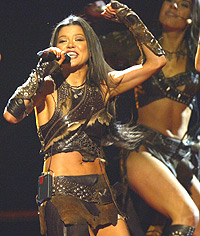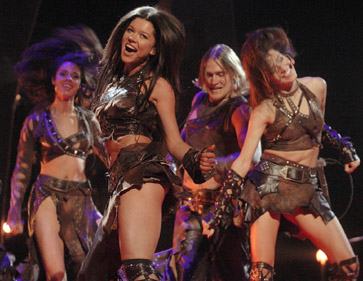|
The Eurovision Song Contest
by Fredrik Haerne
1 June 2004
The Eurovision Song Contest was held recently, and some interesting
observations can be made. Let us start with a short background:
The contest began in Switzerland in 1956, as a way to unite Europe after the
war on Germany. Every member of the European Broadcasting Union has the
right to participate with a song, and up until the nineties only Western
countries would run, as the East was still occupied by the Reds. Now,
however, there are too many European countries to show them all in one
evening, so the member states have to qualify according to rules nobody
really remembers. The only countries that have a permanent spot are Great
Britain, France, Spain and Germany.
As usual the Jewish state has been able to elbow its way in, and Turkey is
also a participant. This year the contest was held in Turkey, as their
contribution won the contest last year.
Participants are expected to portray a certain timeless style, a Eurovision
Song Contest style, which means mainly pop or ballads. Up until a few years
ago participants were also required to sing in their own language, but since
this was seen as handing England and Ireland an unfair advantage
participants can now opt to sing in English instead, which most of them do.
Most countries will hold a national song contest to choose a participant for
the main event. At the end of the Eurovision Song Contest every country is
allowed to give eleven votes, ranging in score from 1 to 10, topped off by a
12. The results are sent from each capital by way of television, all of them
in English except for the French, who have always given their results in
French and always will. In fact, for every other country the votes have to
be repeated by the hosts in both English and French, as France would
otherwise refuse to participate. This is how all Europeans have learned to
say "un point" and "deux points."
Watching the contest this year you have to wonder: if these are the winners,
what were the losers like? Most of the time the songs were forgettable, like
the ones from Norway, Austria and Poland (although the female Polish singer
displayed enough cleavage to make her victory in the national contest
understandable).
Many participants also put darklings on the stage, usually as supporting
singers or dancers, as they normally cannot accomplish the quality necessary
to win the contest themselves. In a show of unusual degeneration the
mediocre French singer brought a shegress with a shaved head on stage, who
was walking around on stilts under a long dress, waving her bare arms
frantically to imitate dance. Rarely has this writer witnessed anything as
laughable and grotesque being passed off as art.
Great Britain and Ireland performed well, and yet they ended up at the 16th
and 23rd place respectively. Unbelievable. But then again, quality isn't
appreciated these days as it once was. As an illustration, Serbia ended up
in a second place with a song of very low quality, easily forgettable. But
then, Serbia hasn't been able to participate for twelve years, so the pity
votes were raining. Also, they have many Slavic neighbors, which is a big
bonus in this contest.
My personal favorite was Malta, which had sent a couple that sang about
their love for each other in an upbeat and slightly humorous way. The woman
was asking the man for proof of his love, and he answered her. Surprisingly,
both of them were opera-trained, which they showed with some examples of
technically difficult singing. Ah, l'amour!
Spain gave a performance clearly recognizable as Spanish, but unfortunately
they didn't make the song as good as it could have been. Perhaps next year.
Germany gave an agreeable performance, with singer Max who won 92 percent of
the phoned-in votes at home.

The winning contribution was a young girl named Ruslana from Ukraine,
singing "Wild Dances" in English. She did not win only because the Slavs
vote on their own, but because her contribution really had some unusual
quality. Along with four dancers Ruslana, from the Carpathian mountains,
entered the stage in clearly "Lord of the Rings"-inspired dresses, brown leather with straps. Four long horns were blown by the dancers before they started an energetic, forceful dance that brought to mind images of White Iron Age warriors dancing before the hunt. At one point they even beat the floor with whips.
Ruslana herself described her song as "ethno-inspired" and inspired by
Carpathian folk songs, which clearly was the reason it stood out from the
rest of the contributions. There was something genuine about it not
generally seen in a song contest held in Europe anno 2004.

Thus, we can draw four lessons. First, the Turkish monuments and ruins shown
in the pause between each song amounted to a requiem over a lost White
civilization, Bysantium. The Turks have no place there; they are intruders,
who have killed off a good people and taken their territory. They are a
swarm of brutality, homosexuality and hairy backs that nobody would miss
should they disappear from the face of the earth tomorrow -- even Arabs look
better.
Second, song and dance, like all art in today's Europe, are at an abysmal
state.
Third, those who give the audience a feeling of what things could be like,
of what we could be like, will always have a huge advantage: I think
of movies like "Braveheart" and "Lord of the Rings," and singers like Ruslana
and the Swedish band Nordman, and the large amount of Celt-imitating music
in any French "Cede" store.
Fourth, Slavs, having mainly been subjected to the economic side of Marxism
and not the social side like the West, have retained some nationalism, and
scratch each other's backs. When the Russians presented their votes the
female head of their jury gave twelve points to "our beloved Slavic
neighbors," Ukraine. Could we imagine a Swede giving twelve points to "our
beloved Germanic neighbors" the Danes? Of course not. The Swedish votes were
not even presented by a Swede, but by a rapist-looking Serb. And the German
presenter held a microphone with a muff painted like the Turkish flag, with
little Turkish paper flags protruding from it on both sides. Heaven forbid
the Germans would actually use a German flag.
It should be noted, however, that Scandinavian countries also show a
tendency to vote for each other; the tendency is general, but nowhere as
strong as in the East, which is the reason Turkey won last year and which is
the reason the results displayed below show four countries only a
stone's throw away from each other at the top of the list. Is there any use,
then, to put East and West in the same contest, when the voting results
clearly do not depend on competence alone? And more importantly, is there
any use in having the same European Union cover East and West, when everyone
knows it means the money will flow eastward and the unemployed rabble will
be flowing westward, with Eastern votes in the Minister Council cementing
the pattern thus?
Clearly, Europe needs to be a Europe of the nations, not a Europe of the
supra-national organizations. Tall fences make good neighbors. Also, Europe
clearly needs to find a way back to itself, both in music and in the rest of
our culture.
The results of the Eurovision Song Contest 2004
1) Ukraine. Ruslana: "Wild Dance" 280 points
2) Serbia and Montenegro. Zeljko Joksimovic & Ad Hoc Orchestra: "Lane
moje" 263
3) Greece. Sakis Rouvas: "Shake It" 252
4) Turkey. Athena: "For Real" 195
5) Sweden. Lena Philipsson: "It Hurts" 170
6) Cyprus. Lisa Andreas: "Stronger Every Minute" 170
7) Albania. Anjeza Shahini: "The Image of You" 106
8) Germany. Max: "Can't Wait Until Tonight" 93
9) Bosnia-Hergegovina. Deen: "In the Disco" 91
10) Spain. Ramon: "Para Llenarme de ti" 87
11) Russia. Julia Savitjeva: "Believe Me" 67
12) Croatia. Ivan Mikulic: "Dajes mi krila" 50
13) Malta. Julie & Ludwig: "On Again. . .Off Again" 50
14) Makedonia. Tose Proeski: "Life" 47
15) France. Jonatan Cerrada: "A chaque pas" 40
16) Great Britain. James Fox: "Hold on to our Love" 29
17) Poland. Blue CafŽ: "Love Song" 27
18) Romania. Sandra: "I Admit" 18
19) Iceland. Jonsi: "Heaven" 16
20) The Netherlands. Re-union: "Without You" 11
21) Austria. Tie-Break: "Du bist" 9
22) Belgium. Xandee: "One Life" 7
23) Ireland. Chris Doran: "If my World Stopped Turning" 7
24) Norway. Knut Anders Sšrum: "High" 3
FREDRIK HAERNE
|